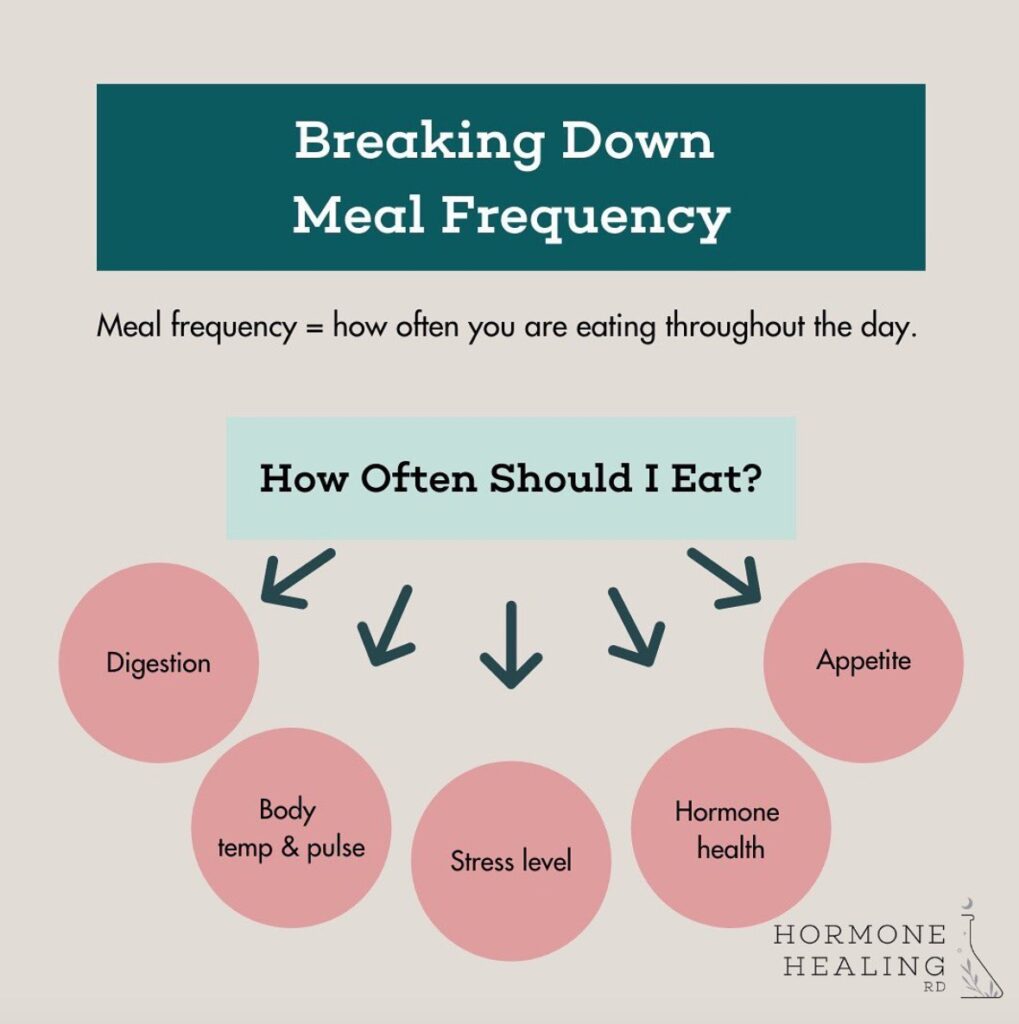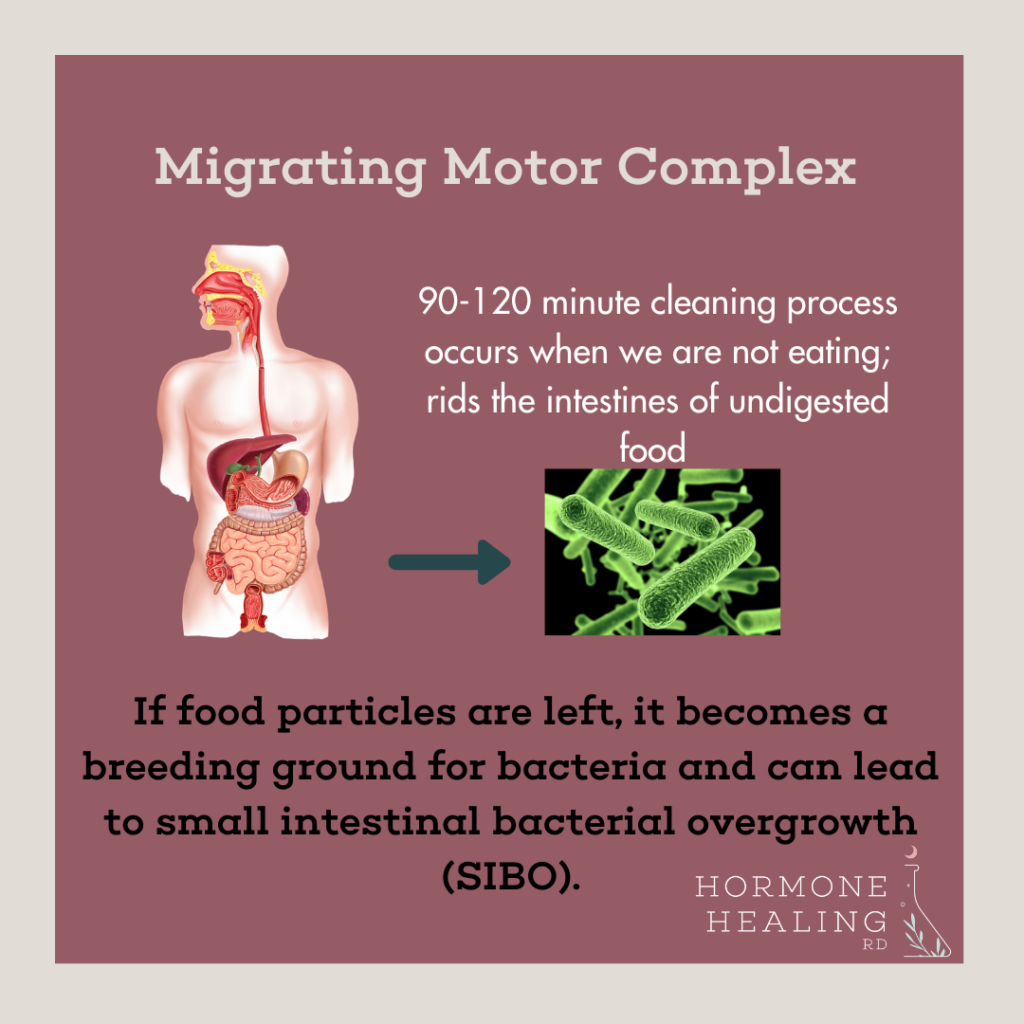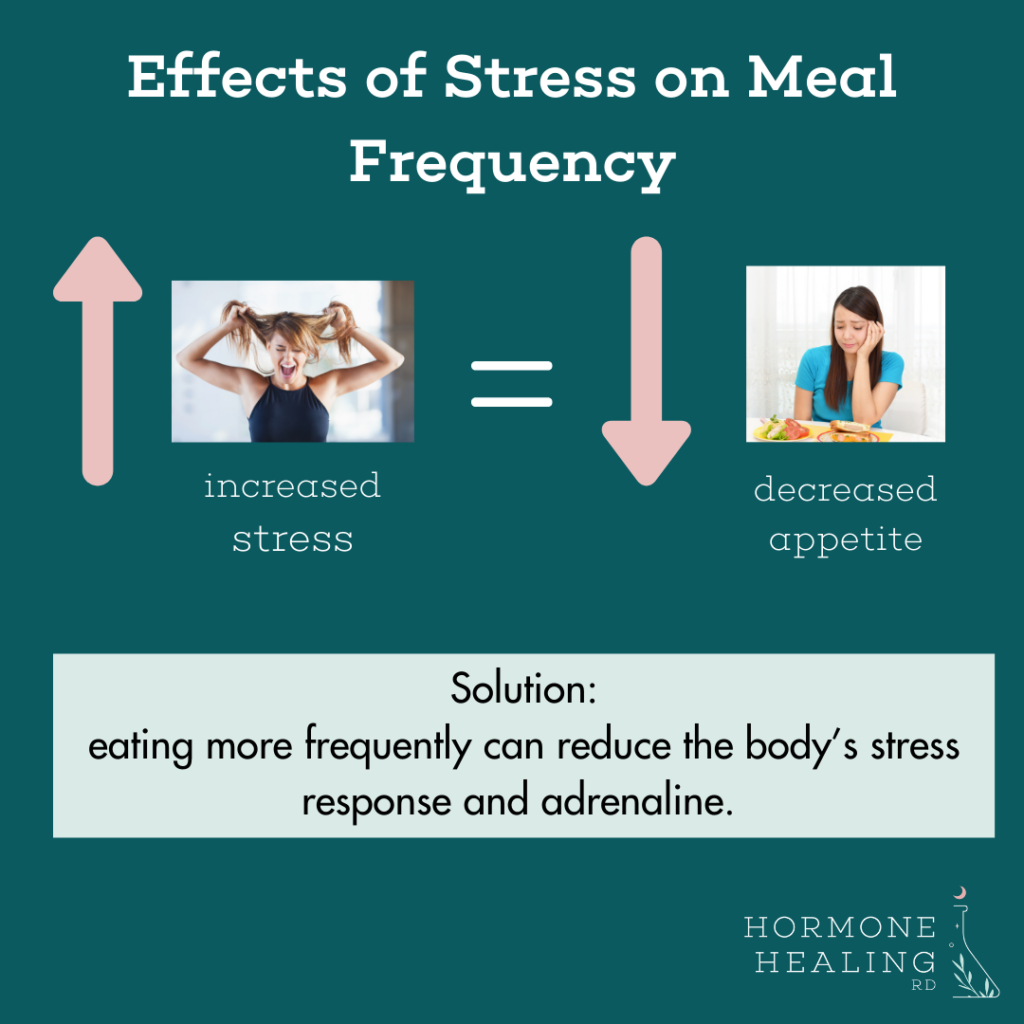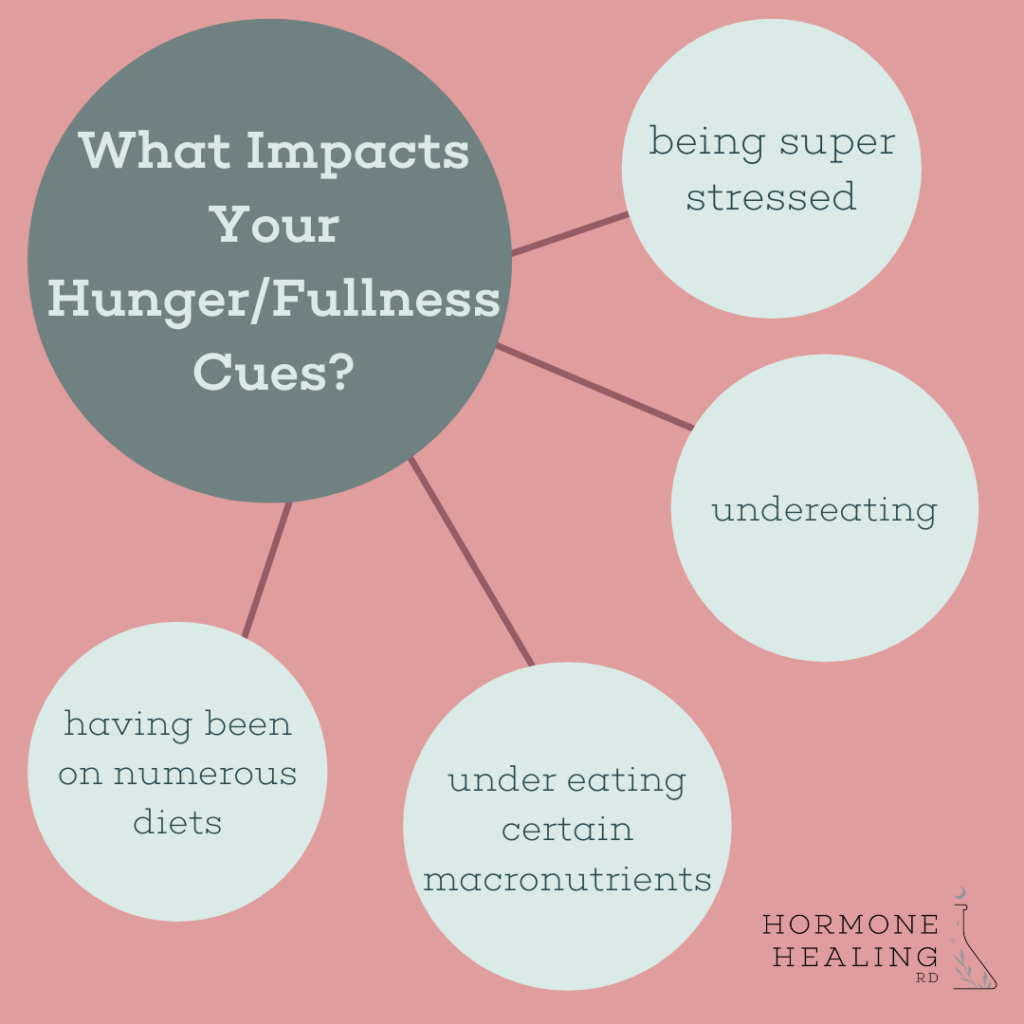There is a lot of controversy around whether you should eat more frequently, only eat three meals and a snack, never snack, or do full-on intermittent fasting. My general recommendation for most people is to eat every 3 to 4 hours. However, I want to emphasize that the number of meals an individual should consume daily is individualized. No two people are the same. Meal frequency depends on the individual. When considering meal frequency, several different factors look at including current hormone health, digestive health, body temperature and pulse, stress level, and appetite.

How is the state of your current hormone health associated with meal frequency?
Do you currently struggle with PCOS, hypothyroidism, fatigue, irregular periods, painful/heavy periods, brain fog, etc.? These are all signs of hormone imbalances. I find in my work with clients struggling with PCOS or hypothyroidism do better eating more frequently. Why? These women often deal with more fluctuations in blood sugar. Reducing these fluctuations by eating balanced meals more often helps to reduce stress. Less stress leads to more balanced hormones, a better functioning thyroid, and better liver glycogen stores (leading to better, uninterrupted sleep).
Hormone health consists of sex hormone health, PCOS, low progesterone, high estrogen, and elevated stress hormones. With preexisting hormone issues, I do not recommend fasting at all. I suggest the complete opposite–eat more often. Of course, this depends on the person. For my clients with PCOS, super low progesterone and/or hypothyroidism, or those who suspect they have a thyroid issue, I have them eat more frequently. As a result, they start to improve metabolic function and see a natural increase in progesterone. Their cycles are more regulated, and they get rid of those period problems. For these individuals, I believe eating more frequently is helpful.
How does your digestive health determine meal frequency?
Individuals who have lots of stress in the gut can eat less frequently (around every 4-5 hours). I have some clients who do better with eating more often if they have smaller meals. The most common feedback I hear from individuals who talk about fasting or waiting long periods between meals is “my migrating motor complex is slow: therefore, it takes me longer to digest food.” More often than not, this is accompanied by constipation.
What is your migrating motor complex (MMC)? Basically, it is an electromechanical process that occurs in the intestines between our meals. The 90 – 120 minute (1 ½ to 2 hours) process occurs when we are not eating. It cleans the intestines to get rid of any undigested food particles. If the food particles are left in the intestines, it becomes a breeding ground for bacteria and can lead to small intestinal bacterial overgrowth (SIBO). While the MMC is essential, we have to think about what could be slowing it down.

If you feel like you do not digest well and have to wait a long time between meals, you probably have a sluggish thyroid and metabolism, which slows down everything else. Sluggish thyroid or hypothyroidism causes slower digestion, detoxification, and hormone production. Everything is affected! In response to hearing clients say they need more time between meals, I ask, “Are your meals balanced?”, “Are you eating foods that are hard to digest such as excess raw veggies, nuts/seeds, grains, and legumes?”. If our digestion slows down, then our MMC is going to be slower. There are several studies on this, and I have found that eating more frequently can speed up digestion with my clients. Anyone who recommends fasting to fix a digestive issue is not thinking about the deeper hormone imbalance or thyroid issues that could be happening to you. The thyroid is usually the root of these issues.
What role do body temperature and pulse play in determining meal frequency?
In my most recent blog, I discussed the importance of tracking your basal body temperature and pulse to monitor thyroid function. If you missed it, I recommend checking it out. Low body temperature coupled with an out of normal range pulse (either really low or extremely high) can indicate thyroid dysfunction. If you are working on improving low body temperature and metabolic function, eating more frequently is helpful. If you are going through my Nutrition Strategies for Better Periods course, you are probably tracking your basal body temperature (BBT) and pulse every day. If you want to get your BBT higher or regulate your pulse to improve your metabolic function and hormone balance, frequent meals can help with that. As I said before, it depends on the individual and their health. Frequent meal consumption has been shown to improve metabolism.
What does stress have to do with meal frequency?
Stress level is another major influencer of how many times a day you should be eating. If you are super stressed and are dealing with anxiety, eating more frequently can reduce the body’s stress response and adrenaline. Are you not eating because you have a high-stress lifestyle? Not eating enough can affect your appetite, which I will get to next. If you are super stressed, one way to take responsibility for your health is to ensure your body receives adequate fuel. Our bodies are designed to keep our blood sugar balanced continually. When our blood sugar drops too low, our bodies will take stored sugar from our liver to keep us stable due to us not eating enough. If we continually do this, we will have trouble sleeping through the night because we do not have enough stored sugar to keep our blood sugar balanced for the 6 to 8 hours that we are asleep.

How does appetite impact meal frequency?
The long-term goal of increased meal frequency is to be able to follow hunger and fullness cues. It may be challenging for individuals experiencing hormone imbalances and a sluggish thyroid to rely on hunger/fullness cues. A lot of hormone imbalances, such as PCOS, PMS, period irregularity, or endometriosis, are going to impact your appetite. There are a few factors that affect your hunger/fullness cues, including being super stressed, having been on numerous diets or undereating, and undereating certain macronutrients. Too often, this leads to a vicious cycle of undereating, then overeating. If you have a poor appetite, the best thing to do is to pay attention and start slowly. I usually recommend adding breakfast to those who tend to skip it. For those who typically delay eating breakfast, I recommend eating within 30 to 60 minutes of waking (even if it is a smaller one and a larger one later). Doing so will improve metabolism.

What happens when you have no appetite at all? If you are waking up with zero appetite, that means you have been using other energy sources for fuel (AKA keeping your blood sugar balanced) while you have been sleeping. Under normal circumstances, you should wake up hungry, which means you were using your liver’s stored energy while you were asleep. Having no appetite in the morning is not a good sign. It tells you that while you were sleeping, your body was using muscle and/or fat tissue and turning it into glucose needed to keep your blood sugar balanced. If you have no appetite, forcing yourself to eat more frequently will not be pleasant. I always recommend starting with just one additional meal. Try eating breakfast and see how you feel. Most of my clients begin to get hungry sooner and notice they are getting more hunger/fullness cues. They have better energy throughout the day and less brain fog.
The number of times you should eat in a day depends on you and your current hormone health, digestive health, body temperature and pulse, stress level, and appetite. Increasing meal frequency can be beneficial to some who experience thyroid dysfunction and slow metabolism. To learn more about optimizing your metabolism and healing your hormones, check out my Master Your Minerals Course. In it, we teach you how to interpret your own HTMA and build a hormone-healing protocol based on your unique results.
Photo by Jarritos Mexican Soda on Unsplash
